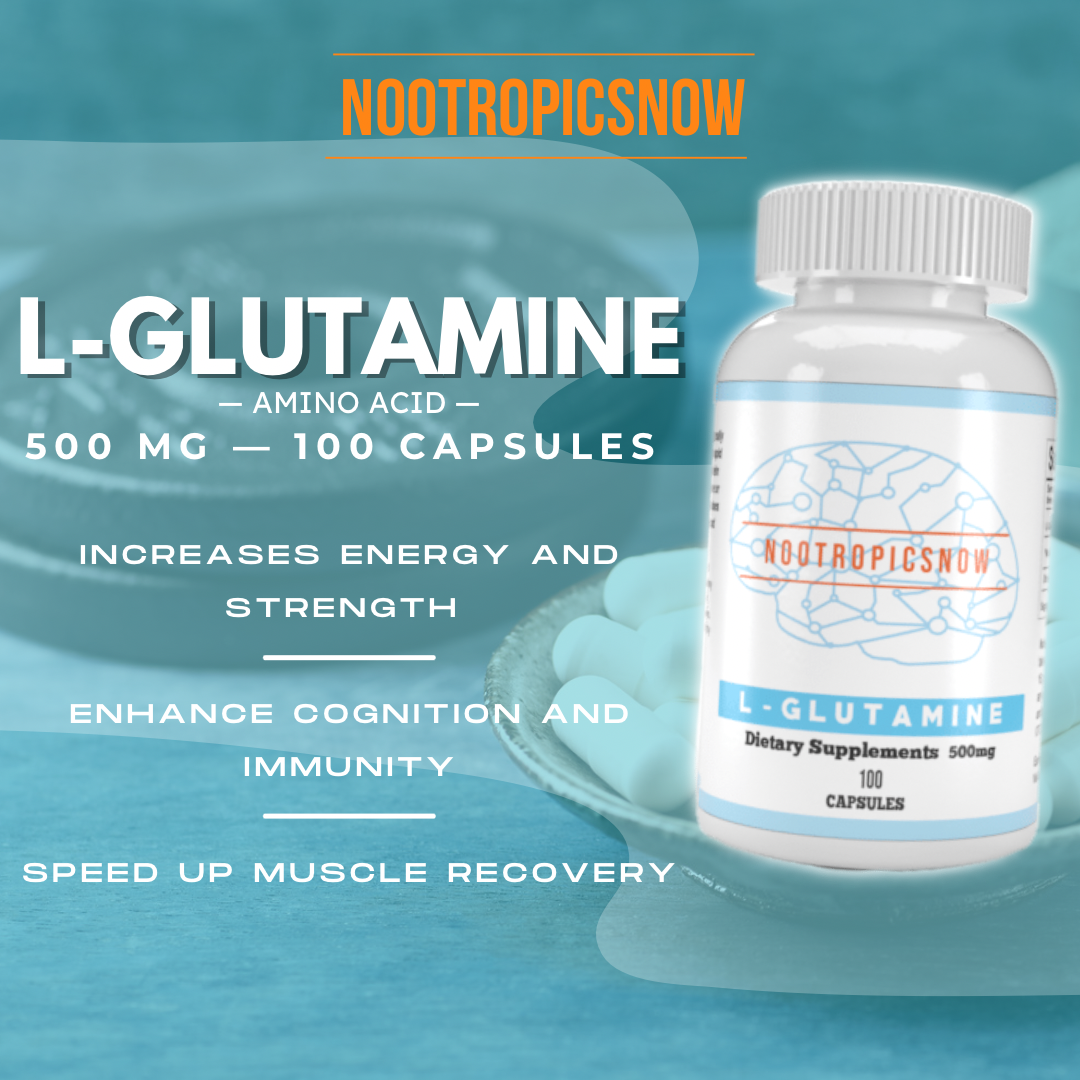L-Glutamine Examine: Benefits & Uses

`markdown
L-Glutamine: An In-Depth Examination of Benefits, Uses, and Considerations
L-Glutamine, also known simply as glutamine, reigns supreme as the most abundant free amino acid present within the human body. It is involved in numerous biochemical functions, underlining its importance in maintaining overall health and well-being. Although classified as a non-essential amino acid, the body’s demand for L-Glutamine can increase significantly under certain circumstances, necessitating supplementation to maintain optimal levels. This section offers a comprehensive examination of L-Glutamine, its roles in the body, potential benefits, and safety considerations.
Understanding L-Glutamine: The Basics

L-Glutamine is a conditionally essential amino acid, meaning the body can usually produce it in sufficient amounts. However, during periods of intense physical stress, such as strenuous exercise, illness, or injury, the body’s demand for glutamine can exceed its production capacity. When this happens, glutamine becomes “conditionally essential,” meaning it must be obtained from dietary sources or supplementation. Therefore, understanding the source and role of glutamine is essential.
Production and Natural Sources
The body synthesizes L-Glutamine primarily in the muscles, which are the major site of glutamine production. The lungs, brain, and liver also contribute to glutamine synthesis, albeit to a lesser extent. Furthermore, you can obtain glutamine through dietary sources. Animal products, including meat, poultry, fish, and dairy, are rich in glutamine. Plant-based sources include beans, spinach, parsley, and raw cabbage.
L-Glutamine vs. D-Glutamine
It’s worth noting the distinction between L-Glutamine and D-Glutamine. L-Glutamine is the naturally occurring form involved in biological processes, while D-Glutamine is a synthetic form that is not readily utilized by the body. Supplements should always contain L-Glutamine to ensure efficacy.
Vital Roles of L-Glutamine in the Body
L-Glutamine participates in numerous vital functions, making it crucial for overall health. These roles include supporting immune function, maintaining gut health, promoting muscle recovery, and more. Each role is critical to ensure proper bodily function.
Immune System Support
L-Glutamine serves as a primary fuel source for immune cells, including lymphocytes and macrophages. These cells are crucial for fighting off infections and maintaining a robust immune response. During times of stress or illness, the demand for glutamine by immune cells increases significantly. Supplementation with L-Glutamine can help support immune function and reduce the risk of infections. Moreover, studies show that lower glutamine levels may compromise the immune system, weakening the body’s defense.
Gut Health and Integrity
The gut lining is a highly active tissue that requires a constant supply of nutrients to maintain its integrity. L-Glutamine plays a crucial role in supporting the health and function of the intestinal cells, known as enterocytes. It provides energy for these cells, helps maintain the tight junctions between them, and promotes gut barrier function. A healthy gut barrier prevents the passage of harmful bacteria and toxins from the gut into the bloodstream, reducing inflammation and supporting overall health. A disrupted gut barrier, often referred to as “leaky gut,” can contribute to various health problems, including inflammatory bowel disease (IBD), food sensitivities, and autoimmune disorders. Further, glutamine’s role in preserving the tight junctions is important.
Muscle Recovery and Growth
L-Glutamine is a key component of muscle protein and plays a role in muscle protein synthesis. It can help reduce muscle breakdown and promote muscle recovery after intense exercise. Furthermore, glutamine may help reduce muscle soreness and fatigue, allowing athletes and fitness enthusiasts to train harder and recover faster. Although research findings have been mixed, many individuals find that glutamine supplementation supports their muscle-building and recovery efforts. Furthermore, research reveals that glutamine is used in muscle protein synthesis.
L-Glutamine: A Deep Dive into its Benefits, Uses, and Research
L-Glutamine is not just another amino acid; it’s the most abundant free amino acid found circulating in human blood and stored in muscles. It plays a pivotal role in numerous physiological functions, ranging from protein synthesis to immune support. Although the body can naturally produce glutamine, certain conditions, such as intense exercise, illness, or injury, can deplete its levels, making supplementation potentially beneficial. This section explores the multifaceted role of L-glutamine, examining its benefits, potential uses, and the latest scientific research.
Understanding L-Glutamine: The Basics
L-Glutamine is a non-essential amino acid, which means the body typically produces enough to meet its needs. However, the “non-essential” label can be misleading. During periods of significant stress or illness, the demand for glutamine can outstrip the body’s ability to produce it, rendering it conditionally essential. In such cases, supplementing with L-glutamine may become necessary to maintain optimal bodily functions.
Production and Dietary Sources
The body primarily produces glutamine in the muscles, where it plays a key role in protein synthesis and muscle recovery. It is also synthesized in smaller amounts in the brain, lungs, and liver. Furthermore, the kidneys play a role in glutamine homeostasis by both producing and utilizing glutamine.
Dietary sources of L-glutamine include:
While a balanced diet can provide a steady supply of glutamine, supplementation offers a more concentrated and controlled way to increase glutamine levels, especially when needs are elevated.
The Multifaceted Functions of L-Glutamine
L-Glutamine is involved in a wide array of biochemical processes, contributing significantly to overall health and well-being. Its functions extend beyond simple protein building, encompassing immune modulation, gut health, and metabolic regulation.
1. Protein Synthesis and Muscle Growth
L-Glutamine is a crucial building block for proteins, which are essential for muscle growth, repair, and maintenance. It helps transport nitrogen, a key component of amino acids, to muscle cells, facilitating protein synthesis. This is particularly important for athletes and individuals engaging in intense physical activity, where muscle breakdown is more pronounced. Studies suggest that L-glutamine supplementation can reduce muscle soreness and accelerate recovery after strenuous exercise.
2. Immune System Support
The immune system relies heavily on glutamine as a primary fuel source for immune cells, including lymphocytes and macrophages. These cells are critical for fighting off infections and maintaining immune surveillance. During illness or injury, glutamine levels can plummet, compromising immune function. Supplementing with L-glutamine can help bolster the immune system, reducing the risk of infection and promoting faster recovery.
3. Gut Health and Intestinal Integrity
L-Glutamine plays a vital role in maintaining the integrity of the intestinal lining. It serves as a primary energy source for enterocytes, the cells that line the small intestine. Glutamine helps to maintain the tight junctions between these cells, preventing “leaky gut” or intestinal permeability. A healthy gut lining is crucial for nutrient absorption and preventing harmful substances from entering the bloodstream. L-Glutamine supplementation may be beneficial for individuals with inflammatory bowel diseases (IBD) like Crohn’s disease and ulcerative colitis, helping to reduce inflammation and improve gut function.
4. Metabolic Functions and Regulation
L-Glutamine is involved in several key metabolic pathways, including:
L-Glutamine also plays a role in regulating insulin sensitivity and blood sugar levels. Some research suggests that glutamine supplementation may improve glycemic control in individuals with type 2 diabetes.
5. Brain Health and Neurotransmission
While the brain synthesizes glutamine in smaller amounts, it is a precursor to glutamate, a major excitatory neurotransmitter. Glutamate is involved in learning, memory, and cognitive function. L-Glutamine also helps to remove excess ammonia from the brain, preventing neurotoxicity. While more research is needed, glutamine may have a role in supporting brain health and cognitive function.
Potential Benefits and Uses of L-Glutamine Supplementation
Given its diverse roles in the body, L-glutamine supplementation has been investigated for a variety of potential benefits and uses.
1. Enhancing Athletic Performance and Recovery
Athletes often use L-glutamine supplements to improve performance and accelerate recovery after intense exercise. Studies suggest that glutamine can reduce muscle soreness, promote muscle protein synthesis, and replenish glycogen stores. However, the evidence for its effectiveness in enhancing athletic performance is mixed, with some studies showing no significant benefit. More research is needed to determine the optimal dosage and timing of glutamine supplementation for athletes.

View Product

View Product
View Product-Nootropic-Brain-Booster-Amino-Acid-Energy-Exercise-i.202321183.23955994962)
2. Supporting Gastrointestinal Health
L-Glutamine is often used to support gut health in individuals with various gastrointestinal disorders, including:
L-Glutamine can help to reduce inflammation, improve gut barrier function, and alleviate symptoms in these conditions. However, it is important to note that glutamine supplementation is not a cure for these disorders and should be used as part of a comprehensive treatment plan.
3. Boosting Immune Function
L-Glutamine supplementation can be beneficial for individuals with compromised immune systems, such as those recovering from surgery, burns, or infections. It can help to support immune cell function, reduce the risk of infection, and promote faster recovery. L-Glutamine is often used in clinical settings to support the immune system of critically ill patients.
4. Improving Metabolic Health
Some research suggests that L-glutamine supplementation may improve metabolic health by regulating insulin sensitivity, blood sugar levels, and lipid metabolism. It may be beneficial for individuals with type 2 diabetes, metabolic syndrome, or obesity. However, more research is needed to confirm these benefits and determine the optimal dosage and duration of glutamine supplementation for metabolic health.
5. Supporting Cancer Treatment
L-Glutamine is sometimes used as a supportive therapy for cancer patients undergoing chemotherapy or radiation therapy. These treatments can damage the intestinal lining and suppress the immune system. L-Glutamine can help to protect the gut barrier, reduce inflammation, and support immune function, potentially mitigating some of the side effects of cancer treatment. However, it is important to consult with an oncologist before using glutamine supplementation during cancer treatment, as it may interact with certain chemotherapy drugs.
6. Sickle Cell Disease
The FDA has approved L-glutamine oral powder (Endari) for reducing the acute complications of sickle cell disease in adults and children over 5 years of age. Endari helps reduce the oxidative stress that damages red blood cells in sickle cell disease, thus reducing pain crises, acute chest syndrome, and hospitalizations. This makes it a significant advancement in managing this inherited blood disorder.
Safety and Potential Side Effects of L-Glutamine
L-Glutamine is generally considered safe for most healthy adults when taken at recommended dosages. However, some potential side effects and precautions should be considered.
Common Side Effects
Precautions
Dosage Recommendations
The optimal dosage of L-glutamine varies depending on individual needs and the specific condition being treated. Generally, dosages range from 5 to 30 grams per day, divided into several doses. Athletes may benefit from higher doses to support muscle recovery, while individuals with gastrointestinal disorders may need lower doses to avoid side effects. It is always best to start with a low dose and gradually increase it as tolerated.
Table: Dosage Recommendations for L-Glutamine
| Condition | Dosage | Notes |
|---|---|---|
| :————————————– | :————————————– | :—————————————————————– |
| Muscle Recovery | 10-30 grams per day | Divided into 2-3 doses, post-workout and before bed |
| Gastrointestinal Support | 5-15 grams per day | Divided into 2-3 doses, taken with meals |
| Immune Support | 10-20 grams per day | Divided into 2-3 doses, during illness or recovery |
| General Health and Well-being | 5-10 grams per day | Single dose or divided into 2 doses |
| FDA Approved Oral Powder(Endari) | Varies based on weight | Please consult with your health care provider for proper dosage. |
L-Glutamine in 2024: The Latest Research and Trends
Research on L-glutamine continues to evolve, with new studies exploring its potential benefits and uses.
Emerging Research Areas
Current Trends
As our understanding of L-glutamine continues to grow, it is likely that its role in health and disease will become even more apparent. Whether you are an athlete looking to enhance performance, an individual with a gastrointestinal disorder, or someone simply seeking to improve overall health and well-being, L-glutamine may offer a valuable tool to support your goals. Always consult with a healthcare professional before starting any new supplement regimen to determine if L-glutamine is right for you.
View Product


